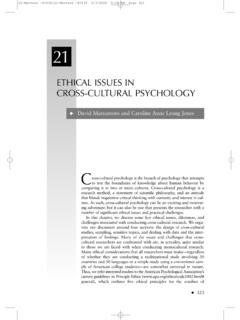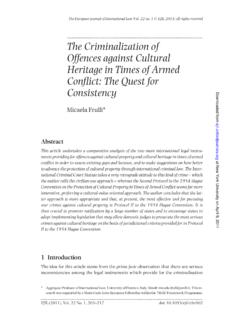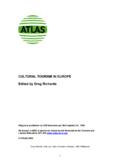Transcription of International Covenant on Economic, Social and …
1 The International Covenant on economic , Social and cultural RightsThe Covenant in generalThe ICESCR aims to ensure the protection of economic , socialand cultural rights including: the right to self-determination of all peoples (article 1); the right to non-discrimination based on race, colour, sex, language, religion, political or other opinion, national or Social origin, property, birth or other status (article 2); the equal right of men and women to enjoy the rights in the ICESCR (article 3); the right to work (articles 6 7); the right to form and join trade unions (article 8); the right to Social security (article 9); protection and assistance to the family (article 10); the right to an adequate standard of living (article 11); the right to health (article 12); the right to education (articles 13 14); and the right to cultural freedoms (article 15).Following article 4, States parties may, in certain circumstances, limit some rights enshrined in the Covenant ; however, such limitations must be determined by law, compatible with the nature of the rights included in the Convention and imposed to promote the general welfare in a democratic Moreover, in keeping with article 2(1), States parties are obliged to undertake steps, in accordance with the maximum of their available resources, to progressively achieve the full realization of the rights contained in the ICESCR.
2 However, the Committee on economic , Social and International Covenant on economic , Social and cultural RightsIntroductionEven before the adoption of the Universal Declaration on Human rights (a non-legally binding document) in 1948, broad agreement existed that the rights which were to be enshrined in the Declaration were to be transformed into legally binding obligations through the negotiation of one or more treaties. In 1966, two separate treaties, covering almost entirely all the rights enshrined in the Universal Declaration of Human rights were adopted after approximately 20 years of negotiations: one for civil and political rights , the International Covenant on Civil and Political rights (ICCPR), and one for economic , Social and cultural rights , the International Covenant on economic , Social and cultural rights (ICESCR). The ICESCR was adopted by the United NationsGeneral Assembly on 16 December 1966 and entered into force on 3 January The Committee has inter alia in General Comment 14, para.
3 28, reiterated the restrictive situations in which such limitations may be If otherwise not referenced the information included in this fact sheet can be found in the International Covenant on economic , Social and cultural rights or on the website of the Office of the United Nations High Commissioner for Human rights ( ). cultural rights has asserted in its General Comment 3 that there exists minimum requirements, core obligations , for all the rights enshrined in the Covenant , that all States parties have to comply with independently of their available following two sections consider those obligations in theCovenant which are directly and indirectly linked to the right to health. While reading this section, keep in mind the introduction to this folder discussing the linkages between the implementation of various human rights and the specific right to linkages to healthThe ICESCR in article 12 establishes the right of everyone to theenjoyment of the highest attainable standard of physical and mental health.
4 The article lists some of the steps to be taken by States partiessuch as: the reduction of stillbirths and infant mortality; ensuring the healthy development of children; improving environmental and industrial hygiene; the prevention, treatment and control of diseases; and access to medical care for all. The Committee on economic , Social and cultural rights has inits General Comment 144 extensively elaborated on what the right to health encompasses and States parties obligations under article 12. What follows is a brief overview of what the Committee has established in relation to the right to health. In considering the normative content of article 12, the Committee highlights that the right to health does not mean the right to be healthy,5 but rather that it takes into account the individual s biological and socioeconomic preconditions, and a State s available resources.
5 TheCommittee emphasizes that the right to health must be understood as a right to the enjoyment of a variety of facilities, goods, services and conditions in order to achieve the highest attainable standard of The Committee also underscores that the right tohealth is an inclusive right which not only obliges States parties to provide timely and appropriate health care, but also to address the underlying determinants of health, such as access to safe and potable water and adequate sanitation, an adequate supply of safe food, nutrition and housing, healthy occupational and environmental conditions, and access to health-related education and information, including on sexual and reproductive The Committee, in General Comment 14, furthermore, outlinesessential and interrelated elements which States parties are to apply while fulfilling their obligations under article 12.
6 Theseelements are: availability; accessibility; acceptability; and quality. Availability signifies that functioning public health and health-care facilities, goods, services and programmes have to be available in sufficient quantity within the State. Accessibility means thathealth facilities, goods and services must be accessible to everyone without discrimination. Accessibility also encompasses: physical accessibility whereby all health services must be within safe physical reach for all sections of the population (it also includes the physical accessibility of underlying determinants of health such as safe and potable water and sanitation facilities); economic accessibility, that all health services are affordable to all; andinformation accessibility which refers to the right to seek, receive and impart information and ideas concerning health issues. 2 economic , Social and cultural Rights5 Ibid.
7 Para. Ibid. para. Ibid. para. General Comment 3, The nature of States parties obligations, UN Doc. E/1991 23, 14 December 1990, para. 10, see also General Comment 14, supra, paras. 43 and General Comment 14, The right to the highest attainable standard of health, UN Doc. , 11 August 2000. It is available in English on: (Symbol) 40d009901358b0e2c1256915005090be?Opendoc ument and in Arabic on: Acceptability refers to States parties obligation to ensure that all health facilities, goods and services are respectful of medical ethics and are culturally appropriate. Lastly, referring to quality , the Committee specifies that States have to guarantee that allservices are scientifically and medically appropriate and of Furthermore, in considering States parties obligations, the Committee states that the right to health imposes three forms of obligations on States parties: the obligations to respect, protect and fulfil.
8 The obligation to respect requires States to refrainfrom interfering directly or indirectly with the enjoyment of the right to health. The obligation to protect requires States to takemeasures that prevent third parties from interfering with article 12 guarantees. Finally, the obligation to fulfil requires States toadopt appropriate legislative, administrative, budgetary, judicial, promotional and other measures towards the full realization of the right to In considering and accepting that different States parties havedifferent possibilities to fulfil their obligations under the Covenant (progressive realization of the Covenant rights to the maximum of States parties resources, article 2), the Committee specifies that thereexist some core obligations that must be fulfilled independentlyof a State party s resources. These core obligations are to:ensure the right of access to health facilities, goods and services on a non-discriminatory basis; ensure access to the minimum essential food that is nutritionally adequate and safe; ensure access to basic shelter, housing and sanitation, and an adequate supply of safe and potable water; provide essential drugs, as defined under theWHO Action Programme on Essential Drugs; ensure equitable distribution of all health facilities, goods and services; and adopt and implement a national public health strategy and plan of action addressing the health concerns of the whole addition to article 12, the ICESCR addresses health concerns in other provisions, such as: the right to work under safe and health working conditions and within reasonable working hours (articles 6 and 7).
9 The special protection to be accorded to mothers before and after childbirth (article 10); and the special protection and assistance to be given to children, in particular to avoid economic and Social exploitation, including such labour which is harmful to their morals or health (article 10). Indirect linkages to healthThe Committee, in its General Comment 14, underscores thatthe right to health is closely related to, and dependent upon, the realization of other human rights contained both in the ICESCR and other human rights instruments such as the rights to food, housing, work, education, human dignity, life, non-3discrimination, equality, privacy, access to information, as well as to the prohibition against torture and the freedoms of association, assembly and The ICESCR enshrines rights which are indirectly linked to theright to health and affect the enjoyment of this right, as notedin the previous paragraph referring to General Comment 14.
10 These rights include: non-discrimination (article 2[2]); equalitybetween men and women (article 3); the right to food, clothing and housing (article 11); the right to water, which although not specifically mentioned in the ICESCR, is deemed to be includedunder articles 11 and 12;12 the right to education (article 13); and the right of everyone to enjoy the benefits of scientific progressand its application and the freedom to perform scientific research(article 15). The Committee on economic , Social and cultural RightsThe Committee in generalThe ICESCR is the only United Nations human rights treatywhich did not establish a Committee to oversee and monitor the implementation of the Covenant . The Committee on Economic, Social and cultural rights was instead established by United Nations economic and Social Council (ECOSOC)13 to carry economic , Social and cultural Rights11 Ibid. para. General Comment 15, The right to water(articles 11 and 12 of the International Covenant on economic , Social and cultural rights ), , 20 January ECOSOC Resolution 1985/17 of 28 May Ibid.














